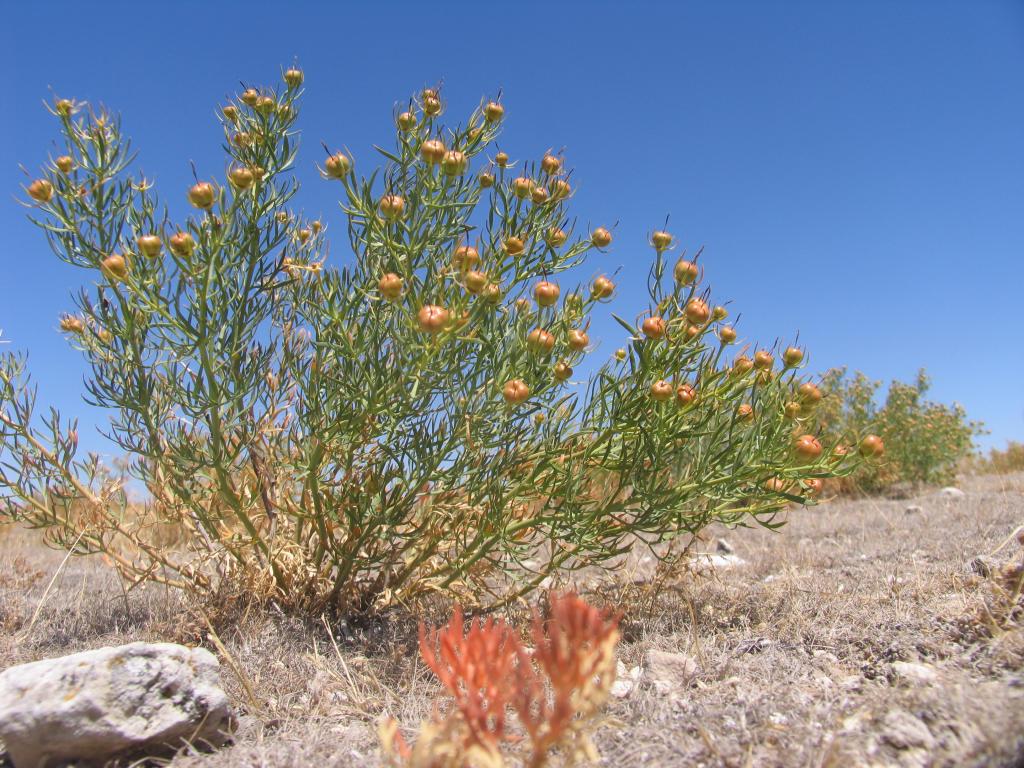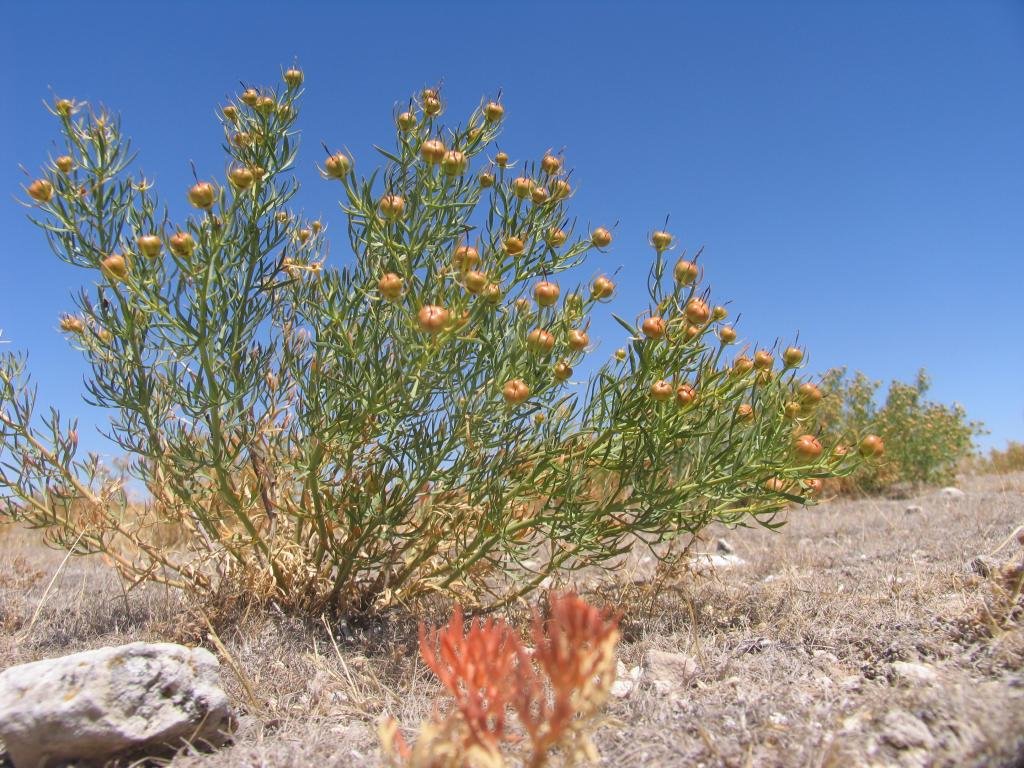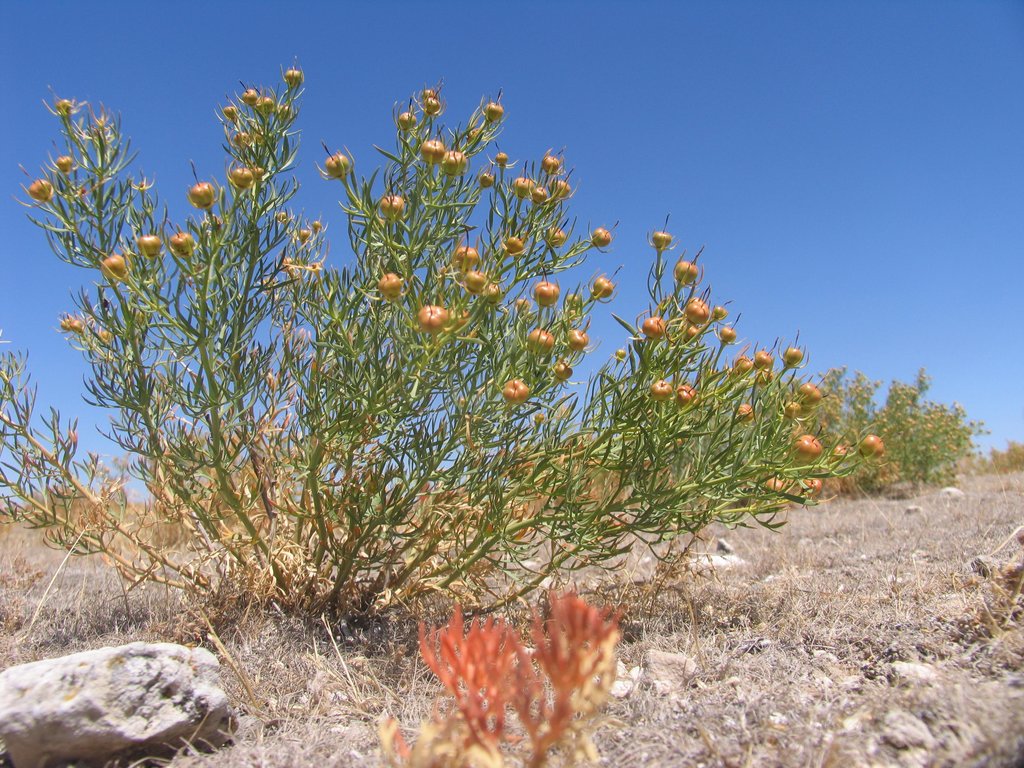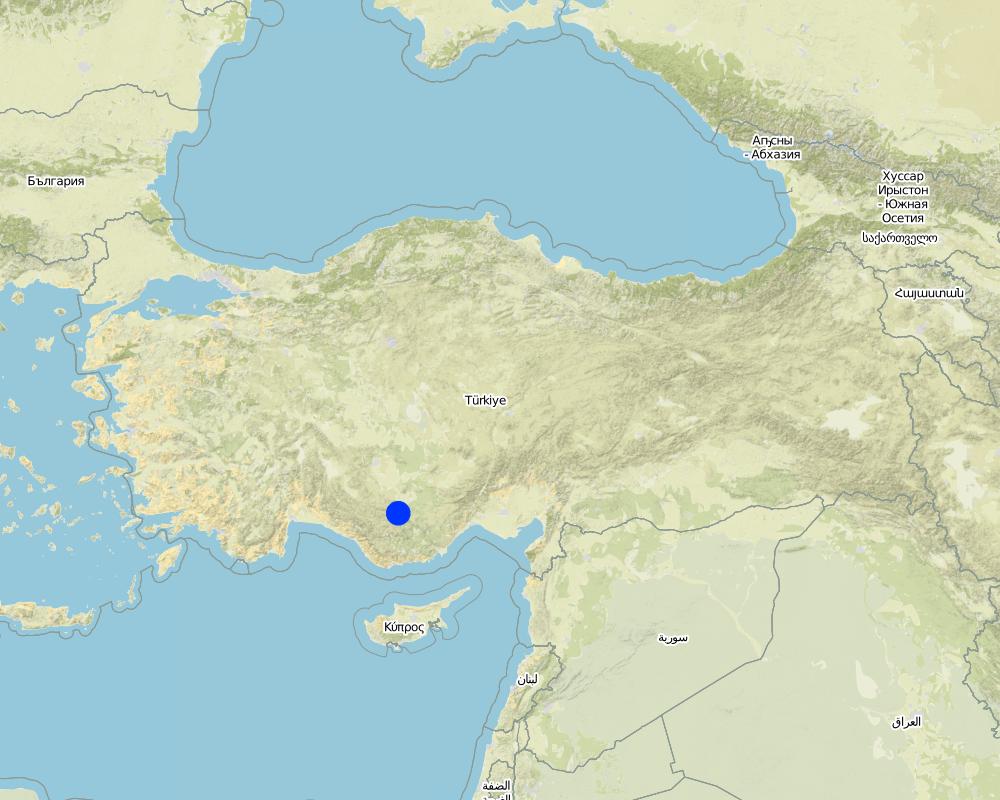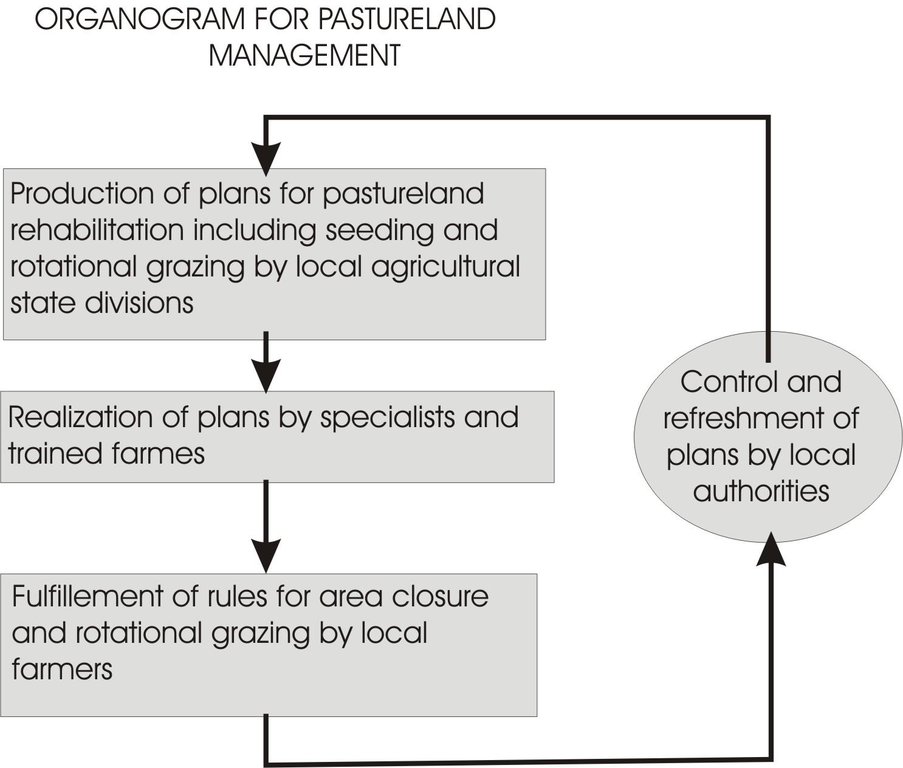Pasture Management [Turquie]
- Création :
- Mise à jour :
- Compilateur : Mehmet Zengin
- Rédacteur : –
- Examinateur : Fabian Ottiger
approaches_2564 - Turquie
Voir les sections
Développer tout Réduire tout1. Informations générales
1.2 Coordonnées des personnes-ressources et des institutions impliquées dans l'évaluation et la documentation de l'Approche
Nom du ou des institutions qui ont facilité la documentation/ l'évaluation de l'Approche (si pertinent)
University of Selcuk, Faculty of Agriculture (University of Selcuk, Faculty of Agriculture) - Turquie1.3 Conditions relatives à l'utilisation par WOCAT des données documentées
Le compilateur et la(les) personne(s) ressource(s) acceptent les conditions relatives à l'utilisation par WOCAT des données documentées:
Oui
2. Description de l'Approche de GDT
2.1 Courte description de l'Approche
Farmers adopting the rotational grazing on pasturelands.
2.2 Description détaillée de l'Approche
Description détaillée de l'Approche:
Aims / objectives: Basic aim of the approach is to rest a certain part of pasture by rotational grazing helped with seeding, fertilizing and area closure to enable the new types and higher amount of herbacous plant cover.
Methods: SWC approach is applied in conjunction with the seeding and fertilizing of pastures in different periods of the year.
Stages of implementation: Teaching and training is achieved in winters, seeding and fertilising in early spring and grazing in winter.
Role of stakeholders: The trained stakeholders are expected to help with the seeding and fertilization activities. All farmes are responsible for the fulfillement of area closure rules.
2.3 Photos de l'approche
2.5 Pays/ région/ lieux où l'Approche a été appliquée
Pays:
Turquie
Région/ Etat/ Province:
Konya
Autres spécifications du lieu :
Karapınar
Map
×2.7 Type d'Approche
- traditionnel/ autochtone
2.8 Principaux objectifs de l'Approche
The Approach focused on SLM only
To conserve pasture areas, to raise whealth of district people, to prevent the immigrant from rural areas to towns and cities.
The SLM Approach addressed the following problems: Lack of money to conserve the naturel pastures, conflict over the use of already poor pastureland, lower income rates from animal feeding, low level of biodiversity (herbaceous plants) and lower biomass production.
2.9 Conditions favorisant ou entravant la mise en œuvre de la(des) Technologie(s) appliquée(s) sous l'Approche
cadre juridique (régime foncier, droits d'utilisation des terres et de l'eau)
- favorise
The existing land ownership, land use rights / water rights moderately helped the approach implementation: Lands belong to state, so no problem arises among the farmers. Sheep owners graze in pastures rotationally and sharely.
- entrave
lack of legal regulation that orginise appropriate exploitation of pasturelands by farmers
Treatment through the SLM Approach: arising the counciseness of sustainable pasture management, increasing the quality and diversity of existing biomass.
3. Participation et rôles des parties prenantes impliquées dans l'Approche
3.1 Parties prenantes impliquées dans l'Approche et rôles
- exploitants locaux des terres / communautés locales
Farmer unions such as irrigation union or specific crop production unions.
Males are culturally dominant in Turkish society. Rural affairs are generaly realised by men.
- ONG
- gouvernement national (planificateurs, décideurs)
Si plusieurs parties prenantes sont impliquées, indiquez l'organisme chef de file ou l'institution responsable:
SLM approach is raised by local specialists of national state governmental organisations and helped with land users.
3.2 Participation des exploitants locaux des terres/ communautés locales aux différentes phases de l'Approche
| Participation des exploitants locaux des terres/ communautés locales | Spécifiez qui était impliqué et décrivez les activités | |
|---|---|---|
| initiation/ motivation | soutien extérieur | local land users inspire and inform specialist and local decision makers for pastureland management |
| planification | soutien extérieur | They are relatively active in the planning phase. |
| mise en œuvre | interactive | land users are particularly involved in the implementation phase. |
| suivi/ évaluation | passive | |
| Research | aucun |
3.3 Diagramme/ organigramme (si disponible)
Description:
Organogram for pasturland management
Auteur:
Mehmet Zengin (Ziraat Fakültesi, Selçuk Üniversitesi, Konya)
3.4 Prises de décision pour la sélection de la Technologie/ des Technologies
Indiquez qui a décidé de la sélection de la Technologie/ des Technologies à mettre en œuvre:
- les spécialistes de la GDT seuls
Expliquez:
Decisions on the method of implementing the SLM Technology were made by by SLM specialists alone (top-down)
4. Soutien technique, renforcement des capacités et gestion des connaissances
4.1 Renforcement des capacités/ formation
Une formation a-t-elle été dispensée aux exploitants des terres/ autres parties prenantes?
Oui
Spécifiez qui a été formé:
- exploitants des terres
- personnels/ conseillers de terrain
Si pertinent, spécifiez le genre, l'âge, le statut, l'ethnie, etc.
Male and active farmers are mostly involved in training activities.
Formats de la formation:
- entre agriculteurs (d'exploitants à exploitants)
- zones de démonstration
- réunions publiques
Thèmes abordés:
Main types of herbacous plants in the region, feeding capacity of certain plant types, importance of area closure for rehabilitation of pastures etc.
4.4 Suivi et évaluation
Le suivi et l'évaluation font ils partie de l'Approche? :
Oui
Commentaires:
bio-physical aspects were ad hoc monitored by project staff, government through observations; indicators: None
technical aspects were ad hoc monitored by government through observations; indicators: None
socio-cultural aspects were ad hoc monitored by government through observations; indicators: None
economic / production aspects were regular monitored by government through observations; indicators: None
area treated aspects were ad hoc monitored by government, land users through observations; indicators: None
no. of land users involved aspects were ad hoc monitored by government through observations; indicators: None
management of Approach aspects were ad hoc monitored by government through observations; indicators: None
There were few changes in the Approach as a result of monitoring and evaluation: Monitoring and evaluation enable the understanding of rotation period for certain areas. The suitable herbaceous types are also safely determined after these works.
There were no changes in the Technology as a result of monitoring and evaluation: None
4.5 Recherche
La recherche a-t-elle fait partie intégrante de l’Approche?
Oui
Spécifiez les thèmes:
- sociologie
- écologie
5. Financement et soutien matériel externe
5.1 Budget annuel de la composante GDT de l'Approche
Si le budget annuel précis n'est pas connu, indiquez une fourchette:
- < 2 000
Commentez (par ex. principales sources de financement/ principaux bailleurs de fonds):
Approach costs were met by the following donors: local community / land user(s) (Individual farmers and farmer unions): 15.0%; local government (district, county, municipality, village etc) (Local branches of agricultural state organizations): 80.0%; national non-government (NGO's such as TEMA): 5.0%
6. Analyses d'impact et conclusions
6.1 Impacts de l'Approche
Est-ce que l'Approche a aidé les exploitants des terres à mettre en œuvre et entretenir les Technologies de GDT?
- Non
- Oui, un peu
- Oui, modérément
- Oui, beaucoup
Rotational grazing are adopted by more land users. Pastures improvement with the seeding and fertilizing is less applied.
Did other land users / projects adopt the Approach?
- Non
- Oui, un peu
- Oui, modérément
- Oui, beaucoup
Local people around who adopted the approach improved their over-grazed pastures in the rate of 50 % by controlled grazing in their pasture lands.
6.2 Principale motivation des exploitants des terres pour mettre en œuvre la GDT
- augmenter la production
- augmenter la rentabilité/ bénéfice, rapport coûts-bénéfices
- réduire la charge de travail
- règles et règlements (amendes)/ application
- prestige, pression sociale/ cohésion sociale
6.3 Durabilité des activités de l'Approche
Les exploitants des terres peuvent-ils poursuivre ce qui a été mis en œuvre par le biais de l'Approche (sans soutien extérieur)?
- non
Si non ou incertain, spécifiez et commentez:
Because they need financial support for seed and fertilizing costs to improve the pastures.
6.4 Points forts/ avantages de l'Approche
| Points forts/ avantages/ possibilités du point de vue de l'exploitant des terres |
|---|
| The approach and technology caused new opportunities and good economy. (How to sustain/ enhance this strength: Attention, money support and measurements.) |
| Points forts/ avantages/ possibilités du point de vue du compilateur ou d'une autre personne ressource clé |
|---|
| Rotational grazing and improving for pasture management is consistent and useful. (How to sustain/ enhance this strength: Money support and training.) |
6.5 Faiblesses/ inconvénients de l'Approche et moyens de les surmonter
| Faiblesses/ inconvénients/ risques du point de vue de l’exploitant des terres | Comment peuvent-ils être surmontés? |
|---|---|
| Until enough improvement of the pasture farmers need fodder for their animal. | Growing fodder in their fields with the government support and teaching. |
| Faiblesses/ inconvénients/ risques du point de vue du compilateur ou d'une autre personne ressource clé | Comment peuvent-ils être surmontés? |
|---|---|
| Especially pasture improving requires money support for soil tillage, fodder seeding and fertilizing. Sometimes there may be conflicts in the grazing of pasture improved. | Government supports and training. |
7. Références et liens
7.1 Méthodes/ sources d'information
- visites de terrain, enquêtes sur le terrain
- interviews/entretiens avec les exploitants des terres
Liens et modules
Développer tout Réduire toutLiens
Aucun lien
Modules
Aucun module trouvé


